Posted on March 7, 2016 by The Orwell Prize -
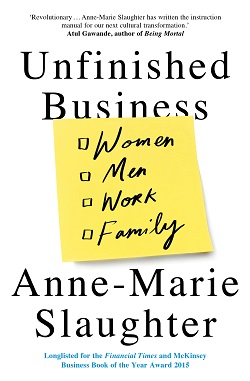
When Anne-Marie Slaughter’s Atlantic article,”Why Women Still Can’t Have it All”first appeared, it immediately went viral, sparking a firestorm of debate across countries and continents. Within four days, it had become the most-read article in the history of the magazine. In the following months, Slaughter became a leading voice in the discussion on work-life balance and on women’s changing role in the workplace. Now, Slaughter is here with her eagerly anticipated take on the problems we still face, and how we can finally get past them. In her pragmatic, down-to-earth style, Slaughter bursts the bubble on all the”half-truths”we tell young women about”having it all”, and explains what is really necessary to get true gender equality, both in the workplace and at home. Deeply researched, and filled with all the warm, wise and funny anecdotes that first made her the most trusted and admired voice on the issue, Anne-Marie Slaughter’s book is sure to change minds, ignite debate and be the topic of conversation. Taken from and read more at https://www.oneworld-publications.com/books/anne-marie-slaughter/unfinished-business#.Vt18_vmLRD8
Posted on March 7, 2016 by The Orwell Prize -
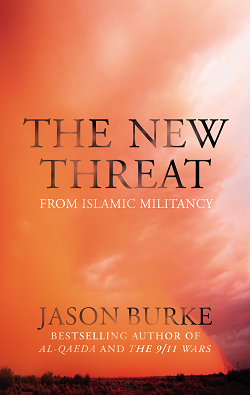
In The New Threat renowned expert and prize-winning reporter Jason Burke provides the clearest and most comprehensive guide to Islamic militancy today.
From Syria to Somalia, from Libya to Indonesia, from Yemen to the capitals of Europe, Islamic militancy appears stronger, more widespread and more threatening than ever. ISIS and other groups, such as Boko Haram, together command significant military power, rule millions and control extensive territories. Elsewhere Al-Qaeda remains potent and is rapidly evolving. Factions and subsidiaries proliferate worldwide, and a new generation of Western Jihadists are emerging, joining conflicts abroad and attacking at home. Who are these groups and what do they actually want? What connects them and how do they differ? How are we to understand their tactics of online activism and grotesque violence?
Drawing on almost two decades of frontline reporting as well as a vast range of sources, from intelligence officials to the militants themselves, renowned expert Jason Burke cuts through the mass of opinion and misinformation to explain dispassionately and with total clarity the nature of the threat we now face. He shows that Islamic militancy has changed dramatically in recent years. Far from being a ‘medieval’ throwback, it is modern, dynamic and resilient. Despite everything, it is entirely comprehensible.
The New Threat is essential reading if we are to understand our fears rather than succumb to them, to act rationally and effectively, and to address successfully one of the most urgent problems of our time.
Taken from and read more at Penguin.
Posted on March 25, 2015 by The Orwell Prize -

In a little over a generation the bones and sinews of the British economy – rail, energy, water, postal services, municipal housing – have been sold to remote, unaccountable private owners, often from overseas. In a series of brilliant portraits the award-winning novelist and journalist James Meek shows how Britain’s common wealth became private, and the impact it has had on us all: from the growing shortage of housing to spiralling energy bills.
Meek explores the human stories behind the incremental privatization of the nation over the last three decades. He shows how, as our national assets are sold, ordinary citizens are handed over to private tax-gatherers, and the greatest burden of taxes shifts to the poorest. In the end, it is not only public enterprises that have become private property, but we ourselves.
Urgent, powerfully written and deeply moving, this is a passionate anatomy of the state of the nation: of what we have lost and what losing it cost us – the rent we must pay to exist on this private island.
Taken from Verso
An extract from Private Island is available here: Sale of the century: the privatisation scam
Posted on March 25, 2015 by The Orwell Prize -

The follies and failures of bankers, regulators and governments have loomed large in public debate over the past five years. In this passionate and hard-hitting book, David Marquand digs deeper. At the heart of our predicament, he argues, lies a profound crisis of our moral economy, our public culture and our democracy. The empire of money has grown remorselessly for three decades, narrowing the space for a common life without which democratic institutions are empty shells. Increasingly, worth is equated with wealth and greed is thought to be good. Inequality has soared as a narrow elite of the super-rich has raced away from the rest of us. Humiliation at the bottom of the pile is matched by callous indifference at the top. The better angels of our nature survive, but they have taken a heavy hit. We are sleepwalking towards a seedy barbarism. The long struggle to master markets and curb property rights in the public interest – a struggle waged by leaders of all the main political families of our history, whether conservative, liberal and socialist or social-democratic – has gone into reverse. The language of the public interest is rarely heard; the notion that the common good should take precedence over individual appetites has virtually disappeared from political discussion. Public trust, essential for properly functioning markets as well as for democratic rule, has plummeted. The fetish of ‘free choice’ has mutated into an unsought communal fate. Marquand’s message is plain: we cannot go on as we are. He sets out the framework of a new public philosophy, based on the values of stewardship, democratic dialogue, civic engagement and freedom from humiliation, to spring the trap into which we have stumbled. Taken from Penguin
Posted on March 25, 2015 by The Orwell Prize -
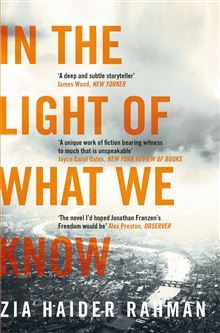
One September morning in 2008, an investment banker approaching forty, his career in collapse and his marriage unravelling, receives a surprise visitor at his West London home. He struggles to place the dishevelled figure carrying a backpack, until he recognizes a friend from his student days, a brilliant man who disappeared years earlier under mysterious circumstances. The friend has resurfaced to make a confession of unsettling power. Theirs is the age-old story of the bond between two men and the betrayal of one by the other. As the friends begin to talk, and as their room becomes a world, a journey begins that is by turns exhilarating, shocking, intimate and strange. Set against the breaking of nations and beneath the clouds of economic crisis, and moving between Kabul, New York, Oxford, London and Islamabad, In the Light of What We Know tells the story of people wrestling with unshakeable legacies of class and culture, and pushes at the great questions of love, origins, science, faith and war. In an extraordinary feat of imagination, Zia Haider Rahman has woven the seismic upheavals of our young century into a novel of rare compassion, scope, and courage. Taken from Pan Macmillan
Posted on March 25, 2015 by The Orwell Prize -

The late 1950s was an action-packed, often dramatic time in which the contours of modern Britain began to take shape. These were the ‘never had it so good’ years, when the Carry On film series and the TV soap Emergency Ward 10 got going, and films likeRoom at the Top and plays like A Taste of Honey brought the working class to the centre of the national frame; when the urban skyline began irresistibly to go high-rise; when CND galvanised the progressive middle class; when ‘youth’ emerged as a cultural force; when the Notting Hill riots made race and immigration an inescapable reality; and when ‘meritocracy’ became the buzz word of the day. The consequences of this ‘modernity’zeitgeist, David Kynaston argues, still affect us today. Taken from Bloomsbury
Posted on March 25, 2015 by The Orwell Prize -
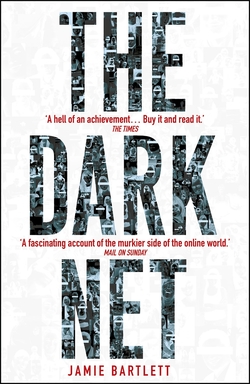
Beyond the familiar online world that most of us inhabit – a world of Google, Hotmail, Facebook and Amazon – lies a vast and often hidden network of sites, communities and cultures where freedom is pushed to its limits, and where people can be anyone, or do anything, they want. A world that is as creative and complex as it is dangerous and disturbing. A world that is much closer than you think. The dark net is an underworld that stretches from popular social media sites to the most secretive corners of the encrypted web. It is a world that frequently appears in newspaper headlines, but one that is little understood, and rarely explored. The Dark Net is a revelatory examination of the internet today, and of its most innovative and dangerous subcultures: trolls and pornographers, drug dealers and hackers, political extremists and computer scientists, Bitcoin programmers and self-harmers, libertarians and vigilantes. Based on extensive first-hand experience, exclusive interviews and shocking documentary evidence, The Dark Net offers a startling glimpse of human nature under the conditions of freedom and anonymity, and shines a light on an enigmatic and ever-changing world. Taken from Random House
Posted on March 25, 2015 by The Orwell Prize -

On June 4, 1989, People’s Liberation Army soldiers opened fire on unarmed civilians in Beijing, killing untold hundreds of people. A quarter-century later, this defining event remains buried in China’s modern history, successfully expunged from collective memory. In The People’s Republic of Amnesia, NPR and former BBC correspondent Louisa Lim charts how the events of June 4th changed China, and how China changed the events of June 4th by rewriting its own history. Lim reveals new details about those fateful days, including how one of the country’s most senior politicians lost a family member to an army bullet, as well as the inside story of the young soldiers sent to clear Tiananmen Square. She also introduces us to individuals whose lives were transformed by the events of Tiananmen Square, such as a founder of the Tiananmen Mothers, whose son was shot by martial law troops; and one of the most important government officials in the country, who post-Tiananmen became one of its most prominent dissidents. And she examines how June 4th shaped China’s national identity, fostering a generation of young nationalists, who know little and care less about 1989. For the first time, Lim uncovers the details of a brutal crackdown in a second Chinese city that until now has been a near-perfect case study in the state’s ability to rewrite history, excising the most painful episodes. By tracking down eyewitnesses, discovering US diplomatic cables, and combing through official Chinese records, Lim offers the first account of a story that has remained untold for a quarter of a century. The People’s Rebulic of Amnesia is an original, powerfully gripping, and ultimately unforgettable book about a national tragedy and an unhealed wound. Taken from Oxford University Press
Posted on March 25, 2015 by The Orwell Prize -
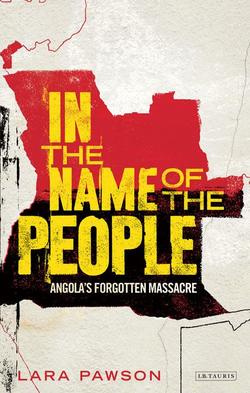
On 27th May 1977, a small demonstration against the MPLA, the ruling party of Angola – led to the slaughter of thousands, if not tens of thousands, of people. These dreadful reprisals are little talked of in Angola today – and virtually unknown outside the country. In this book, journalist Lara Pawson tracks down the story of what really happened in the aftermath of that fateful day. In a series of vivid encounters, she talks to eyewitnesses, victims and even perpetrators of the violent and confusing events of the 27th May and the following weeks and months. From London to Lisbon to Luanda, she meets those who continue to live in the shadow of the appalling events of 40 years ago and who – in most cases – have been too afraid to speak about them before. As well as shedding light on the events of 1977, this book contributes to a deeper understanding of modern Angola – its people and its politics; past, present and future. Taken from I. B. Tauris
Posted on March 25, 2015 by The Orwell Prize -

At first, it seemed like a small story. The royal editor of the News of the World was caught listening to the voicemail messages of staff at Buckingham Palace. In 2007 he and a private investigator were sentenced to prison and the case was closed. But Nick Davies felt sure there was more to it and began his painstaking investigation which ultimately exposed a world of crime and cover-up, of fear and favour – reaching all the way to the top. This book is the definitive, inside story of one of the major scandals of our age. Drawing on exclusive interviews with private investigators, journalists, politicians, police officers and Murdoch executives, it blows the lid off Fleet Street, Scotland Yard – and Downing Street. It tells for the first time how Davies and a network of rebel lawyers, MPs and celebrities took on Rupert Murdoch, one of the most powerful men in the world. It takes us into the newsroom of the News of the World and exposes the bullying and law-breaking that went on there, and into the underworld of the private investigators who hacked phones, listened to live calls and bribed the police. It discloses how News International attempted to protect itself with lies and money; how the press regulator floundered; and the history of failure and official secrecy inside police ranks. Above all, this book paints an intimate portrait of the power elite which gave Murdoch privileged access to government, and allowed him and his people to intimidate anyone who stood up to them. Hack Attack is a nail-biting account of an investigative journalist’s quest, and is a shining example of the might of good journalism. It tells the story of what happened when truth caught up with power. Taken from Random House
Posted on March 25, 2015 by The Orwell Prize -

The UK Independence Party (UKIP) is the most significant new party in British politics for a generation. In recent years UKIP and their charismatic leader Nigel Farage have captivated British politics, media and voters. Yet both the party and the roots of its support remain poorly understood. Where has this political revolt come from? Who is supporting them, and why? How are UKIP attempting to win over voters? And how far can their insurgency against the main parties go? Drawing on a wealth of new data – from surveys of UKIP voters to extensive interviews with party insiders – in this book prominent political scientists Robert Ford and Matthew Goodwin put UKIP’s revolt under the microscope and show how many conventional wisdoms about the party and the radical right are wrong. Along the way they provide unprecedented insight into this new revolt, and deliver some crucial messages for those with an interest in the state of British politics, the radical right in Europe and political behaviour more generally. Taken from Routledge
Posted on March 25, 2015 by The Orwell Prize -

Roy Jenkins was probably the best Prime Minister Britain never had. But though he never reached 10 Downing Street, he left a more enduring mark on British society than most of those who did. His career spans the full half-century from Attlee to Tony Blair during which he helped transform almost every area of national life and politics. On top of all this, Jenkins was a compulsive writer whose twenty-three books included best-selling biographies of Asquith, Gladstone and Churchill. As Chancellor of Oxford University he was the embodiment of the liberal establishment with a genius for friendship who knew and cultivated everyone who mattered in the overlapping worlds of politics, literature, diplomacy and academia; he also had many close women friends and enjoyed an unconventional private life. His biography is the story of an exceptionally well-filled and well-rounded life. Taken from Random House
Posted on March 25, 2015 by The Orwell Prize -

Dan Davies has spent more than a decade on a quest to find the real Jimmy Savile, and interviewed him extensively over a period of seven years before his death. In the course of his quest, he spent days and nights at a time quizzing Savile at his homes in Leeds and Scarborough, lunched with him at venues ranging from humble transport cafes to the Athenaeum club in London and, most memorably, joined him for a short cruise aboard the QE2. Dan thought his quest had come to an end in October 2011 when Savile’s golden coffin was lowered into a grave dug at a 45-degree angle in a Scarborough cemetery. He was wrong. In the last two and a half years, Dan has been interviewing scores of people, many of them unobtainable while Jimmy was alive. What he has discovered was that his instincts were right all along and behind the mask lay a hideous truth. Jimmy Savile was not only complex, damaged and controlling, but cynical, calculating and predatory. He revelled in his status as a Pied Piper of youth and used his power to abuse the vulnerable and underage, all the while covering his tracks by moving into the innermost circles of the establishment. Taken from Quercus
Posted on March 25, 2015 by The Orwell Prize -

When Rana Dasgupta arrived in Delhi at the turn of the twenty-first century, he had no intention of staying for long, but the city beguiled him – he ‘fell in love and in hate with it’ – and fifteen years later, Delhi is still his home. Over these fifteen years, he has watched as the tumult of destruction and creation which accompanies India’s economic boom transformed the face of the city. In Capital, he explores the life-changing consequences for Delhi’s people, meeting with billionaires and bureaucrats, drug dealers and metal traders, slum dwellers and psychoanalysts. These encounters, interwoven with over a century of history, plunge us into Delhi’s intoxicating, sometimes terrifying, story of capitalist transformation – one that has repercussions not only for India, but for everybody’s future. Taken from Canongate
Posted on May 21, 2014 by The Orwell Prize -

Alan Johnson’s childhood was not so much difficult as unusual, particularly for a man who was destined to become Home Secretary. Not in respect of the poverty, which was shared with many of those living in the slums of post-war Britain, but in its transition from two-parent family to single mother and then to no parents at all…
This is essentially the story of two incredible women: Alan’s mother, Lily, who battled against poor health, poverty, domestic violence and loneliness to try to ensure a better life for her children; and his sister, Linda, who had to assume an enormous amount of responsibility at a very young age and who fought to keep the family together and out of care when she herself was still only a child.
Played out against the background of a vanishing community living in condemned housing, the story moves from post-war austerity in pre-gentrified Notting Hill, through the race riots, school on the Kings Road, Chelsea in the Swinging 60s, to the rock-and-roll years, making a record in Denmark Street and becoming a husband and father whilst still in his teens.
This Boy is one man’s story, but it is also a story of England and the West London slums which are so hard to imagine in the capital today. No matter how harsh the details, Alan Johnson writes with a spirit of generous acceptance, of humour and openness which makes his book anything but a grim catalogue of miseries.
Taken from Penguin.
Posted on April 24, 2014 by The Orwell Prize -

Award-winning journalist James Fergusson is among the few to have witnessed at first hand the devastating reality of life in the failed and desperate state of Somalia. This corner of the world has long been seen as the rotting and charred heart of Africa: a melting pot of crime, corruption, poverty, famine and civil war. And in recent years, whilst Somalia’s lucrative piracy industry has grabbed the headlines, a darker, much deeper threat has come of age: the Al Qaida-linked militants Al Shabaab, and the dawn of a new phase in the global war on terror. Yet, paradoxically, Somalia’s star is brightening, as forms of business, law enforcement and local politics begin to establish themselves, and members of the vast Somali diaspora return to their homeland. Fergusson takes us to the heart of the struggle, meeting everyone from politicians, pirates, extremists and mercenaries to aid workers, civilians and refugees. He gives a unique account of a country ravaged by war, considers what the future might hold for a generation who have grown up knowing little else and exposes the reality of life in this hard, often forgotten land. Taken from Random House
Posted on April 24, 2014 by The Orwell Prize -
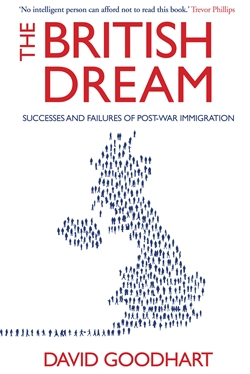
In The British Dream, David Goodhart tells the story of post-war immigration and charts a course for its future. Drawing on hundreds of interviews with people from all over the country and a wealth of statistical evidence, he paints a striking picture of how Britain has been transformed by immigration and examines the progress of its ethnic minorities – projected to be around 25 per cent of the population by the early 2020s. Britain today is a more open society for minorities than ever before, but it is also a more fragmented one. Goodhart argues that an overzealous multiculturalism has exacerbated this problem by reinforcing difference instead of promoting a common life. The multi-ethnic success of Team GB at the 2012 Olympics and a taste for chicken tikka masala are not, he suggests, sufficient to forge common bonds; Britain needs a political culture of integration. Goodhart concludes that if Britain is to avoid a narrowing of the public realm and sharply segregated cities, as in many parts of the US, its politicians and opinion leaders must do two things. Firstly, as advocated by the centre right, they need to bring immigration down to more moderate and sustainable levels. Secondly, as advocated by the centre left, they need to shape a progressive national story about openness and opportunity – one that captures how people of different traditions are coming together to make the British dream. Taken from Atlantic
Posted on April 24, 2014 by The Orwell Prize -
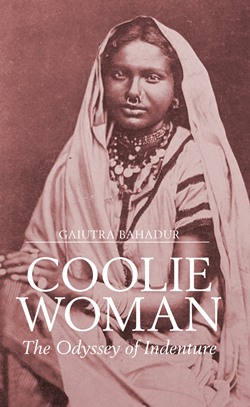
In 1903 a Brahmin woman sailed from India to Guyana as a ‘coolie’, the name the British gave to the million indentured labourers they recruited for sugar plantations worldwide after slavery ended. The woman, who claimed no husband, was pregnant and travelling alone. A century later, her great-granddaughter embarks on a journey into the past, hoping to solve a mystery: what made her leave her country? And had she also left behind a man? Gaiutra Bahadur, an American journalist, pursues traces of her great-grandmother over three continents. She also excavates the repressed history of some quarter of a million female coolies. Disparaged as fallen, many were runaways, widows or outcasts, and many migrated alone. Coolie Woman chronicles their epic passage from Calcutta to the Caribbean, from departures akin either to kidnap or escape, through sea voyages rife with sexploitation, to new worlds where women were in short supply. When they exercised the power this gave them, some fell victim to the machete, in brutal attacks, often fatal, by men whom they spurned. Sex with overseers both empowered and imperiled other women, in equal measure. It also precipitated uprisings, as a struggle between Indian men and their women intersected with one between coolies and their overlords. Taken from Hurst Books

















